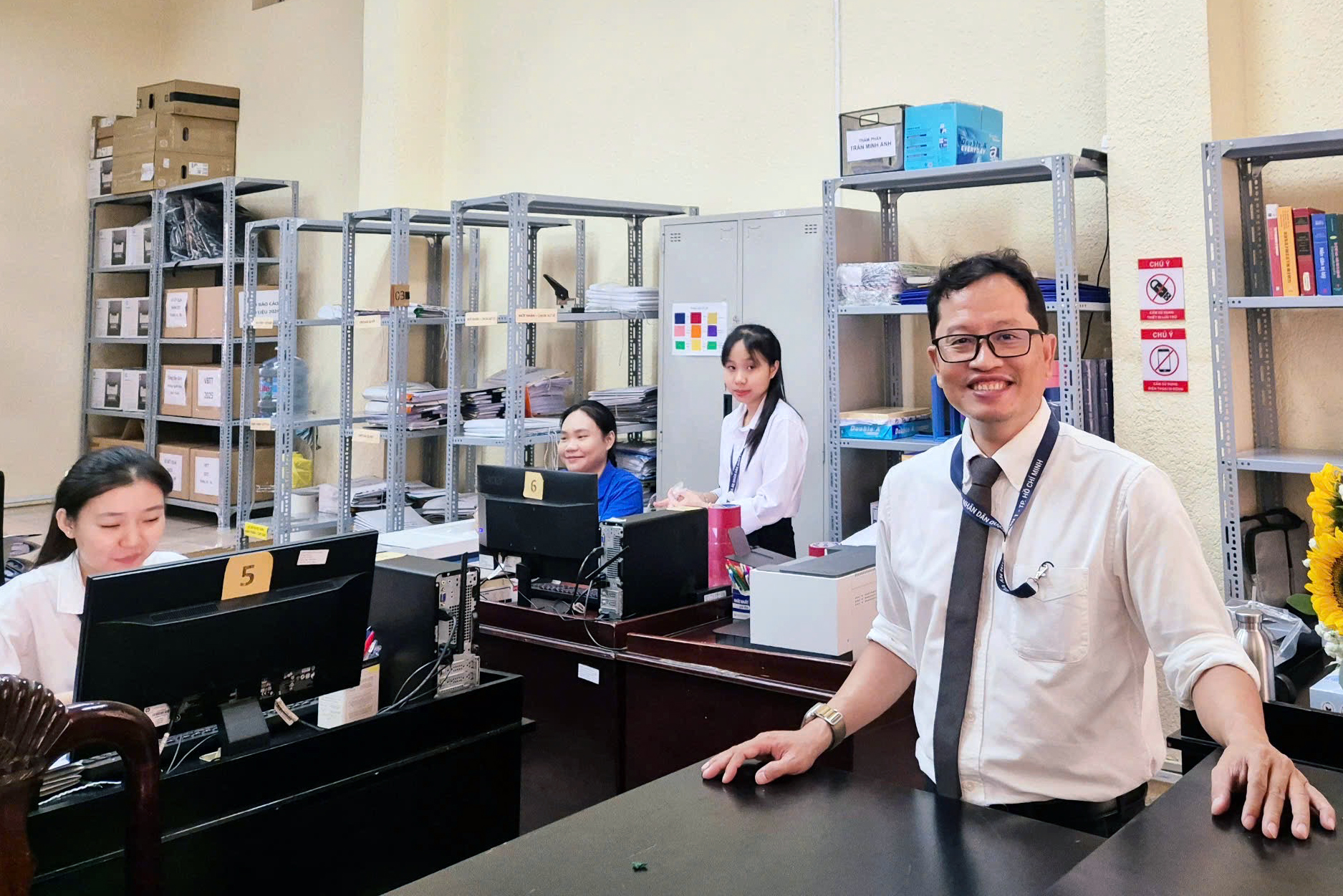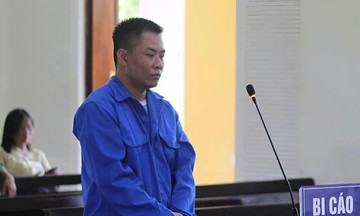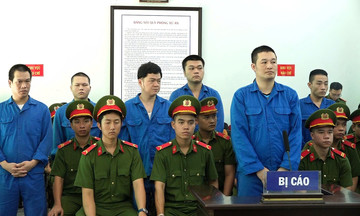Nguyen Cao Tri, 43, a US-educated tech engineer, currently works as a technology specialist at the People's Court of Region I in Ho Chi Minh City, which covers the former districts 1, 3, and 4.
A tech enthusiast from a young age, Tri began writing software as a student and won several national youth computer science competitions. In 2000, he received two scholarships to study abroad, including one in information technology at Houston Community College (USA). At the same time, he was also accepted directly into a Vietnamese university to study law, but he decided to defer his admission to study abroad.
After 4 years in the US, he worked as a programmer for a company in Singapore before returning to Vietnam. Not wanting to be an employee, in 2005, at the age of 24, he started an online sports company. Soon after, the company received funding from a foreign investment fund. In 2016, he sold the company for millions of USD.
"With financial security, I returned to my initial passion - studying law and becoming a lawyer," Tri shared. "I realized that to be a successful entrepreneur, a strong understanding of law is essential, so I reapplied to law school."
 |
Nguyen Cao Tri currently works at the People's Court of Region I as a technology specialist. Photo courtesy of the subject. |
Nguyen Cao Tri currently works at the People's Court of Region I as a technology specialist. Photo courtesy of the subject.
A turning point for the 'trainee lawyer'
In June 2023, while completing his master's degree in law and lawyer training, Tri unexpectedly changed course. He became an IT specialist at the People's Court of District 1 after a chance encounter with Chief Justice Nguyen Quang Huynh.
Sharing a passion for collecting old books, Huynh purchased a set from Tri online. On 1/6, Tri personally delivered the books to the court, expressing his interest in an internship to complete his studies. Their conversation, extending from afternoon to evening, led to Huynh learning about Tri's tech expertise and sharing his vision for an e-court system.
"I enthusiastically agreed. He asked how long it would take to develop the software. I said, 'Give me a year, or 6 months if things go quickly.' But I think he was skeptical, unsure if I could deliver or if I was just being optimistic," Tri recounted.
Following the meeting, he was accepted as an intern. After nearly half a year familiarizing himself with court procedures and real-world case files, Tri and Huynh frequently exchanged ideas. In October 2023, when the court system launched its digital transformation initiative, the Chief Justice of the People's Court of District 1 officially initiated the e-court project, entrusting Tri with its development.
'Digitalization is about creating data'
According to Tri, the first step in digital transformation is having data. He suggested to Chief Justice Huynh the formation of a 7-member digitalization team, including himself, with a monthly salary of 5 million VND from the court.
"Currently, many courts in Vietnam are only using IT for data management, not true digital transformation. Digitalization is about creating data, while digital transformation is about changing the entire workflow from paper to a digital environment, on a digital platform," Tri explained.
The biggest challenge in implementing the e-court model isn't technology but changing management mindsets and reorganizing internal processes. This restructuring, not just the software, is key to the system's smooth operation.
"The traditional working habits of judges and court officials need to change while still adhering to procedural law and Supreme People's Court regulations. This isn't easy and requires decisive action," Tri stated.
Nguyen Cao Tri discusses the development of the e-court model. Video: Hai Duyen.
Determined to realize the e-court model, Tri, the digitalization team, and many court officials often worked late into the night, including weekends. Sharing the court leadership's passion, he expressed his desire to contribute to the development of the judicial system, bringing Vietnamese courts closer to global digital justice trends.
After 6 months, the e-court software was implemented at the People's Court of District 1. Data was updated in stages and was largely complete by the end of 2024. Early this year, the court transitioned to a fully digital environment, marking a complete transformation. After the district merger, data from the former districts 3 and 4 is being integrated.
Tran Minh Anh, 35, a judge at the People's Court of Region 1, shared his experience with the e-court model. He explained that previously, each court had only one physical logbook for procedural documents, forcing judges to wait, even queue, for their turn. In courts with multiple locations, they had to travel to the main office to register and issue documents. Now, this is done online, on-site, quickly and conveniently.
With each judge handling around 200 cases, scanning and saving issued documents in the digital database makes it easier to track the resolution process: what documents have been issued, the current stage, and any errors.
The digital database, with thousands of digitized judgments and decisions, also facilitates case law research, especially for rare cases. Judges can simply enter keywords to find similar cases, shortening research time and providing valuable references for judicial proceedings.
When presenting documents or evidence in court, instead of searching through paper files, judges can simply enter the document title into the system, and the information appears instantly. "Digitalization not only makes the legal process more transparent but also demonstrates a modern approach to case management, significantly reducing time and effort," Anh said.
AI assists judges in voice-activated document retrieval and case summarization. Video: Nguyen Cao Tri.
Chief Justice Nguyen Quang Huynh: 'A thousand-dollar salary might not have been enough to recruit Tri'
Smiling humbly when asked about his "5 million VND salary," Tri explained that while salary is a tool to attract personnel and a measure of contribution, it's not the deciding factor for him. "I believe that doing something beneficial for the justice system, especially the courts, is part of my personal value. After selling my company, I felt financially secure and wanted to pursue my passion," he shared.
His family fully supports and understands his choice. Before taking on this role, he ensured his family's financial well-being, eliminating financial pressure.
 |
Millions of pages from thousands of case files over the years have been digitized by the People's Court of Region 1. Photo: Nguyen Cao Tri. |
Millions of pages from thousands of case files over the years have been digitized by the People's Court of Region 1. Photo: Nguyen Cao Tri.
Chief Justice Huynh stated that Tri's financial compensation is primarily symbolic. "With his expertise, offering a higher level of compensation would be entirely justified. But what's most valuable is his choice to work with the court out of idealism. He doesn't come from the legal field but poured his heart and soul into developing this software as a gift to the court," Huynh commented.
Tri, having studied and worked abroad, has a particular interest in law. During his master's program, he frequently interned at courts and observed the heavy workload and manual processes. This led him to propose the e-court model – leveraging technology to enhance efficiency.
According to Huynh, the court used its own funds to implement the software, investing in equipment and mobilizing staff from administrative departments and volunteers to build a "clean" database that adheres to legal regulations during the digitalization process.
"Digital court models have long been adopted globally. As Vietnam implements Resolution 57 of the Central Committee on national science, technology development, and digital transformation, the court system's push for technology adoption is both appropriate and urgent," Huynh stated, adding that the model has received positive feedback and is being recommended by the Supreme People's Court for wider adoption.
The e-court system – internal management at the People's Court of Region I is the first of its kind in the Vietnamese judicial system to operate entirely digitally. Developed in-house, the software digitalizes the entire case handling process, from intake and assignment to trial and archiving. This model improves efficiency, reduces errors, and lays the foundation for the future digital transformation of the court system.
Tri has completed his master's in law and is preparing for the bar exam. "But if the court still needs me, I'm ready to continue supporting them. My current work is related to law, which is also a passion of mine," he said.
 |
Nguyen Cao Tri and the digitalization team of the People's Court of Region 1, Ho Chi Minh City. Photo: Hai Duyen. |
Nguyen Cao Tri and the digitalization team of the People's Court of Region 1, Ho Chi Minh City. Photo: Hai Duyen.
Hai Duyen












